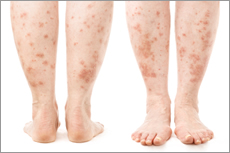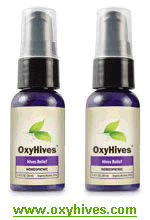Hives Treatment Center Over 150,000 patients helped since 2001
![]()
 What Is Angioedema?
What Is Angioedema?
Angioedema is very similar to hives in that there is swelling of the skin, except that the swelling is not just on the surface of the skin, but deep underneath the skin. This swelling is caused by your immune system pumping fluids into the affected area as a way of combating the allergen that is affecting the area. The swelling is usually around the eyes, lips and ears and in rarer cases on the hands, feet and throat.
Angioedema may not itch as much as regular hives, but is sometimes accompanied by a burning sensation and pain. It's important to note though that not everyone who gets angioedema will get hives.
Angioedema can last longer than a regular hives rash, but usually only lasts 24 hours unless a hives medication is taken. Most people that suffer from angioedema experience it on a recurring basis unless treated properly.
Angioedema Treatment |
|
 |
What Causes Angioedema?
Angioedema is most commonly caused by allergic reactions, when histamine is released into the bloodstream to fight the allergen. Your immune system thinks there is a foreign substance called allergens in your system, and tells the body to release histamines to fight them off. This can cause the swelling which in most cases is quite painful unless a treatment for hives is taken.
The causes of angioedema most of the time remain unknown. There are certain things that are common causes, or what are called triggers, for angioedema though. These include, but are not limited to:
-
Dog or cat dander (shed skin cells)
-
Drug allergies (antibiotics, aspirin, sulfa, penicillin, ACE inhibitors like blood pressure medications, etc.)
-
Overexposure to cold (see cold hives), heat (see heat hives), water or sun (AKA sun hives)
-
Food allergies (shellfish, eggs, nuts, milk, berries, fish, etc.)
-
Insect stings and bites
-
Pollen or hay fever
-
Infections or illness like Lupus, Lymphoma and Leukemia
What Are The Angioedema Symptoms?
Angioedema symptoms include:
-
Swelling around the eyes, lips and ears. Rarer cases will also get swelling on hands, feet and throat.
-
The swelling may also itch and is sometimes accompanied by a burning sensation and pain.
-
There may or may not be red or skin colored welts / hives that appear in the area.
-
If hives also appear on top of the skin, they are usually painful and very itchy.
-
Rarer cases will also experience abdominal cramping and breathing difficulty due to the amount of swelling.
Is Angioedema Dangerous?
Angioedema can be deadly if your throat swells up so much that you can no longer breath. If you feel that your breathing is becoming more and more restricted and that you may soon not be able to get any air into your lungs, call 911 immediately!
How Do I Cure My Angioedema?
Angioedema can come and go for more than a month, depending on if you get treatment or not. For most people, OxyHives works very well. It has none of the harmful side effects other medications do and has proven to help with angioedema. Learn more on our hives treatment page.
In a few cases of angioedema, a steroid can be prescribed, but please be aware of their potential side effects: weight gain, liver tumors, jaundice, fluid retention and high blood pressure.